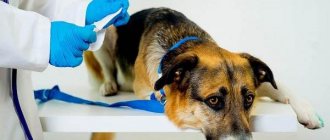If a dog appears in the family, you need to think not only about nutrition and care, but also about the health of the pet. While walking on the street, she can become infected with dangerous infections transmitted in different ways.
Pathogens can be brought into the home on clothing or the soles of shoes. Timely vaccination according to the calendar will help protect your dog from various diseases.
In the article we will look at the importance of vaccinations for dogs, what diseases they protect against, types of drugs and vaccination schedules, contraindications.
Dog vaccination rules
Protective antibodies obtained from mother's milk remain in the puppies' bodies for up to 1.5 months. Gradually, the natural immune defense begins to weaken, so there is a need for vaccination, which forms the body’s artificial defense against various types of infections.
Dogs are vaccinated according to the vaccination schedule, starting at two months of age. Vaccinations are done according to certain rules. Before the procedure, the dog must be properly prepared, which will eliminate side effects and other undesirable consequences of vaccination.
How to prepare your dog for the procedure
Vaccination is carried out only for healthy animals. Before vaccination, the veterinarian must examine the dog and give permission for this procedure.
Preparing the dog:
- 2 weeks before vaccination it is necessary to carry out antiparasitic treatment, including deworming.
- Measure the dog's body temperature daily for 7 days before vaccination.
- Avoid contact with other animals for several days before the procedure.
The owner must monitor the dog's condition, provide adequate nutrition and control stool. If certain signs of illness are detected, you should contact your veterinarian and explain in detail what signs are suspicious. The doctor will conduct a follow-up examination and take tests if necessary. If the animal's unhealthy condition is confirmed, vaccination will be postponed until the dog has fully recovered.
Caring for your pet after vaccination
After vaccination, it is necessary to follow some recommendations from care professionals.
What do we have to do:
- Limit contact with other animals.
- Provide the dog with good nutrition and rest.
- On the day after vaccination, any physical activity and bath procedures are contraindicated.
Detailed recommendations for caring for your dog after the immunization procedure are provided by the attending veterinarian.
Summarize
Before any procedure, you need to make sure your pet is in complete health. Be sure to pay attention to his appetite and behavior. Don’t forget what vaccinations a dog needs at a certain age, follow the schedule. Be attentive to even minor manifestations of deviations, as this can save the dog. And don’t forget that there is no vaccine that will provide one hundred percent protection. Only high-quality nutrition, vitamins, sufficient physical activity, your care and endless love will help ensure a long and happy life for your furry friend.
Types of vaccines
Dogs are given two types of vaccinations - live with a weakened virus and non-live. Based on the number of antigens, vaccines are divided into monovalent and polyvalent. The first contain antigens of one disease. The latter form immunity to several infections at once.
Veterinary clinics will offer the owner vaccines of imported and domestic production. Most experts give preference to foreign drugs that show high efficiency. The cost of such vaccines is somewhat more expensive than their domestic counterparts.
What vaccinations are given to puppies up to one year old?
In the first year of life, the dog receives 5 mandatory vaccinations, followed by revaccination within strictly defined periods. At the request of the owner and the recommendation of the doctor, additional vaccinations against certain infections at risk for a particular animal can be given.
Vaccination schedule for puppies
The most dangerous diseases for dogs are rabies, distemper, parovirus enteritis, leptospirosis, enteritis, parainfluenza and viral hepatitis. Most of these diseases are difficult to tolerate and can lead to the death of the animal. Some infections are also dangerous for humans. For example, rabies and leptospirosis, which affects the liver, kidneys and stomach.
Timing of vaccination for dogs in the first year of life
From distemper, leptospirosis, viral hepatitis, enteritis and parainfluenza Primary vaccination - 8-10 weeks Revaccination - 11-13 weeks Repeated vaccination - 6-7 months. and at 12 months.
Rabies Primary vaccination – 11-13 weeks
Additionally, the dog can be vaccinated against trichophytosis and microsporia. The recommended age for the planned procedure is 2-6 months of life, the second vaccination after 2 weeks. Revaccination – every year with an interval of 12 months.
Vaccination of adult dogs
Adult dogs are vaccinated against the same infections as small puppies. After primary vaccinations, the animal’s body has good protection against viruses for a certain period of time, but gradually it weakens, so revaccination is necessary.
Revaccination schedule for adult dogs
Against plague, parovirus enteritis and hepatitis Revaccination every 3 years
Coronavirus enteritis, microsporia, parainfluenza Annual revaccination with an interval of 12 months.
Leptospirosis Revaccination once every 12 months annually. According to indications, the terms may be reduced.
Vaccination calendar: vaccination of dogs against rabies
Rabies is a dangerous infectious disease that cannot be cured. If infected, the dog dies painfully. The disease also poses a threat to humans. To protect the whole family, be sure to vaccinate your pets against rabies according to the vaccination schedule.
Rabies vaccination and revaccination schedule for dogs
First rabies vaccination 12-13 months
Revaccination Every year with an interval of 12 months.
Necessity
The word “vaccination” means a special vaccine that is administered to an animal at certain periods of life and protects its body from the action of infectious agents.
The vaccine may contain live weakened or killed microorganisms. The introduction of these drugs reduces the risk of possible infection of the pet when encountering an infection, and in the event of a disease, it reduces the severity of complications. Therefore, vaccinating a dog is a top priority for any owner.
Where is it better to get vaccinated: at home or in a clinic?
You can vaccinate your dog at home or at a veterinary clinic. The main thing is to enter all the data about the procedure performed into the pet’s veterinary passport.
Features of vaccination at home and in the clinic:
- Vaccination at home is easier for animals. In a familiar environment, the dog feels safe. In addition, you do not have to organize a trip to the clinic. You need to call an experienced veterinarian to your home. It is very important that he follows all vaccination rules and uses high-quality drugs for administration. The only drawback of this procedure is the additional costs associated with paying a specialist to visit your home.
- Vaccination at the veterinary clinic is carried out as planned. You must make an appointment in advance. It is better to transport the dog to the clinic in a private car to avoid any contact on the street with other animals. The cost of the procedure is low.
The owner needs to think in advance which of these two options will be optimal for his pet.
Veterinary passport
An international veterinary passport is the most important document for a dog, without which long trips with a dog around the country, travel abroad, participation in exhibitions and breeding are impossible.
The most important points of a dog’s veterinary passport are:
- vaccination against rabies and other infectious animal diseases;
- flea and tick treatment;
- deworming;
- reproduction.
The document also contains information about the owner of the animal, identification (in the case of implantation of an electronic chip) and some characteristics of the dog, in particular gender, color and special features.
Exceptions and contraindications
Dogs are vaccinated according to the vaccination calendar, but in some cases the procedure has to be postponed for a certain period. There are also some contraindications to vaccination of some animals. Let's take a closer look at this issue.
When not to vaccinate your dog:
- The animal is sick.
- Low immunity.
- Vaccinations are not given to puppies under 2 months of age.
- During the period of change of milk teeth.
- Before mating (90 days quarantine after vaccination).
- The dog was found to have an individual intolerance to the components included in the vaccine, which manifests itself as an allergic reaction.
Puppies growing up without a mother can receive their first vaccination at 6-8 weeks. This is due to a lack of natural immune protection, which the baby could not receive from mother's milk.
The timing of vaccination may change due to the epidemiological situation in the area. For example, if outbreaks of certain infections are recorded, the dog may be vaccinated ahead of schedule.
Dog vaccinations: pros and cons
Vaccination of pets is carried out with the consent of the owner, so only he can decide whether to vaccinate the pet or not. According to veterinarians, it is unacceptable to refuse such a procedure. The risk of infection in unvaccinated animals is very high. Not only other dogs or rodents can be carriers of infection. Some diseases are transmitted by airborne droplets, entering the house along with dust particles, food, etc. By refusing vaccination, you are exposing the life and health of your dog to enormous risks. The diseases for which vaccinations are given cause serious complications, which can result in the painful death of the animal. To avoid dangerous consequences, you need to listen to the opinion of doctors and vaccinate your dog according to age.
Disadvantages of vaccination are possible complications that arise after the injection. The dog's body temperature may rise, loss of appetite, general condition worsen, vomiting and loose stools. If side effects are detected, the animal must be urgently shown to a specialist. The veterinarian will select treatment to eliminate adverse symptoms.
Complications of vaccination occur infrequently and are mainly due to improper preparation of the animal for the planned procedure or when using a low-quality vaccine. The doctor must examine the dog before giving the vaccination. To ensure everything goes smoothly, choose trusted veterinary clinics with a good reputation and qualified staff.
Should an old dog have vaccinations?
There is an opinion that after 8 years of age a dog does not need to be vaccinated. In fact, none of the instructions for the vaccine contain any restrictions related to the age of the animal. The only condition is that the animal must be clinically healthy. Therefore, the veterinarian has the right to postpone or cancel vaccination, taking into account the clinical condition of the animal, but not on the basis of great age. Without annual vaccination, your dog becomes vulnerable to infections, so the possible harm from vaccination is more than offset by the benefits of vaccination.
Everything you need for a happy and comfortable life for your four-legged friend can be purchased on our online store website. The catalog contains a huge selection of products for dogs - high-quality food, vitamin and mineral complexes, care accessories, cozy beds, toys, collars, parasitic and anthelmintic treatments and much more. Orders are accepted online. Sending goods to all regions of the Russian Federation.
Complications
Many owners are afraid not so much of the vaccination itself, but of the complications it can cause. At the moment, the complex vaccine administered to dogs is of high quality, and side effects occur extremely rarely, but their occurrence cannot be completely excluded. The first post-vaccination day is considered the most difficult, and the dog needs to be given increased attention during this time. If the pet is apathetic and lethargic, refuses to eat, and has a slight rise in temperature, then there is nothing to worry about. Many people wonder how long such symptoms can last. The next day everything should go away. If after a day there is no improvement, the dog has a fever, vomiting, diarrhea, drooling, or convulsions, then it is necessary to immediately consult a veterinarian.
As soon as the long-awaited dog appears in the house, the owner needs to decide on a clinic, since it not only needs love, but also protection. The veterinarian will help you choose an individual vaccination schedule, which will determine not only your life expectancy, but also your health.











